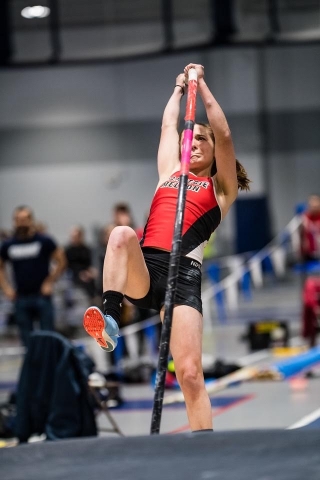A top-notch gymnast as a young girl, it was the athletic art of pole vaulting that captured Michelle Karabin’s attention as a teenager—and helped her become a sports champion while an undergraduate at Carnegie Mellon University.
“It was the best feeling ever when you clear the bar, especially during an important track meet, and you're on the way down…to know all your hard work, discipline, and training paid off, and you achieved your goal,” Karabin explains.
Being a champion pole vaulter also led to Karabin’s interest in the field of whole body biomechanics. To her, it was “incredible to watch people accomplish astonishing results just by the way they moved their bodies in a precise manner.”

ARCS Scholar Michelle Karabin is focusing her PhD research on vestibular
hypofunction, or vestibular loss. When this occurs, people can lose their
ability to stand, walk, and have a high risk of falling and injuring themselves.
(Courtesy: Michelle Karabin)
Currently, ARCS Scholar Michelle Karabin is a second-year student at University of Pittsburgh compiling PhD research on bioengineering, with a focus on biomechanics. Her studies center around balance issues in people with inner ear problems, also known as vestibular hypofunction (loss), where the nerve that connects information from your ear to your brain is compromised. According to Karabin, the loss of balance can lead to problems walking, daily mobility, and an increased risk of falling.
Karabin says vestibular loss can occur from an ear infection, vertigo, and migraines—and from the aging process. “Our ears have hair cells that help us hear. Similarly, we also have hair cells in our vestibular system. As people age, those hairs start to degrade.”
About thirty percent of Americans over the age of forty have some form of vestibular issues, Karabin adds.
To improve rehabilitation methods for people with vestibular issues, the ARCS Scholar is using a combination of experimental and computational modeling techniques. She analyzes data from experiments involving healthy individuals versus people with vestibular health issues, examining the different responses in gait, balance, stepping, and walking abilities.

ARCS Scholar Michelle Karabin creates a computer simulation of
someone walking with and without vestibular hypofunction. The simulation
will help Karabin recommend new rehabilitation and therapy techniques
for those diagnosed with the health issue.
(Courtesy: Michelle Karabin)
Karabin uses those datasets to build simulations to investigate the leading problems caused by vestibular hypofunction—and how to fix those issues through rehabilitation.
“Vestibular issues can be very debilitating and severely limit the quality of life for some people. I think it is important to improve rehabilitation techniques for this population, especially their stability and mobility, and help them resume daily activities—and an active life,” she explains.
Karabin says ARCS also inspired her PhD research. She became an ARCS Scholar award recipient in 2020, as she was deciding between graduate schools and PhD programs. “When I learned I was a recipient, I took it as a sign to stay in Pennsylvania, attend University of Pittsburgh, and follow my passion into the field of biomechanics,” she states. “I'm grateful for the opportunities, financial and otherwise, that ARCS continues to give me.”
Karabin hopes to focus on a career in academia and more clinically-based research.

